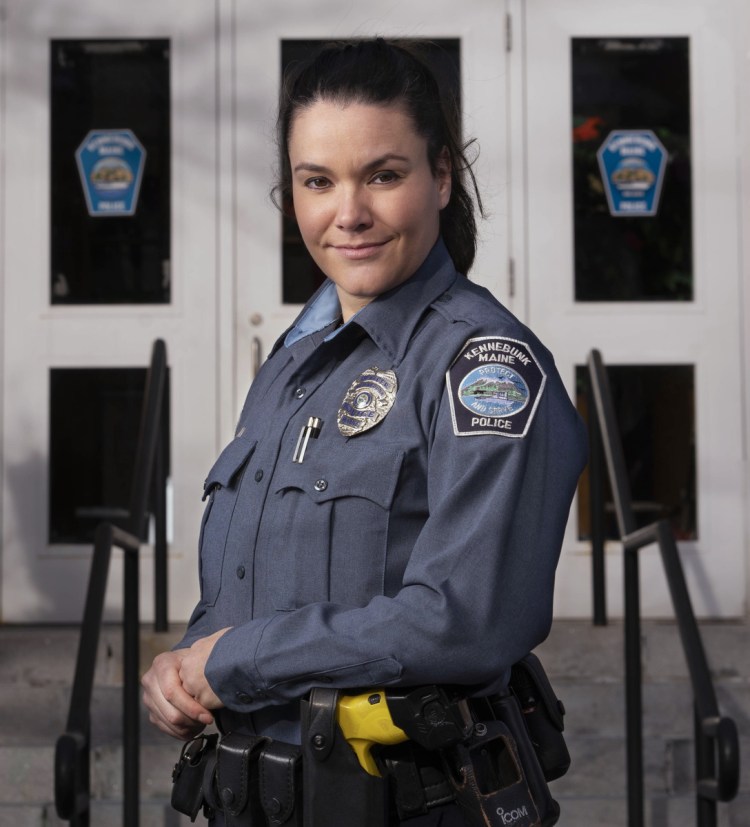Kennebunk Police Chief Bob MacKenzie said he’s ready to try something different to combat the opioid crisis, by enlisting police officers and other first responders to help break a cycle caused by people struggling with substance use disorder.
The cycle begins with an arrest, and many times after the person is released, they return to using and are then arrested again, often for misdemeanor crimes. The ineffective system is frustrating for everyone, including police officers, sheriffs who run the county jails and people with substance use disorder, MacKenzie said.
Some die. Drug overdose deaths in Maine climbed to a record 418 in 2017, and were at 180 through the first six months of 2018. For those who survive, they often return to the same patterns, and police officers see the same people over and over again.
MacKenzie is championing a new approach, which will be to train police officers, firefighters and paramedics in Kennebunk and nearby towns to be recovery coaches, in a program that is likely the first of its kind in Maine.
A training session will be held in late January and early February, and members of the public also can sign up for recovery coach training. A total of 60 people will be trained.
OFFERING HELP AND SUPPORT
A recovery coach is someone who helps a person with substance use disorder obtain treatment and provides support during and after treatment.
“Instead of doing our business with them and saying ‘I hope we don’t see you next time,’ we want to work with people to minimize the chances that there will be a next time,” MacKenzie said. “It is just common sense.”
MacKenzie said many of the people with substance use disorder who are arrested have lost support from family or friends, allies who normally would help someone get into and through a treatment program.
“They’ve burned a lot of bridges with family, and the support just isn’t there for a lot of them. They’re left more or less by themselves,” MacKenzie said. “Unless they get help, they’re going to go right back to what they know.”
The free all-day training will be held on four days, Jan. 29 through Feb. 1, at the West Kennebunk Fire Department, and is being run by Recovery Coach University in New York. More than $50,000 in donations was raised by Maine nonprofit charity Above Board, which makes the program free to participants. Maine-based Enso Recovery also will help with the program.
Kennebunk police Officer Kaitlyn Sawyer attended a different recovery coach training in March, and said it already has had an impact on how she does her job, primarily on how she interacts with people who are suffering from substance use disorder.
“It’s really taught me to take that big, deep breath and be empathetic,” Sawyer said.
She said before she may have not been relating to the people she arrested as much, and was more focused on the tasks of being a patrol officer. Now, she tries to look at issues from their perspective.
“We frequently encounter people at their lowest point,” she said. “If we can treat people as humans rather than criminals we can really help people.” Sawyer said she sees herself as a pre-recovery coach, making sure those who need help get access to treatment.
But Sawyer said if someone commits a crime, they should still be arrested. “Part of recovery is taking responsibility for your actions,” she said.
MacKenzie believes the program will be the first of its kind in the state where the police department acts as a partner in recovery coach training, and treatment advocates say that’s likely the case. Recently, there’s also been a movement – supported by Gov. Janet Mills – to make substance use disorder treatment more widely available in county jails. Other police departments, such as in Scarborough and Sanford, have worked to connect people to treatment programs. Also, in recent years, Maine police and fire departments are more likely to carry naloxone, an overdose antidote.
MAKING TREATMENT AVAILABLE
Medicaid expansion, implemented Thursday by Mills on her first day in office, also will open up treatment to previously uninsured Mainers because the patients now will be referred to programs that are reimbursed by Medicaid. That is important to recovery coaches, MacKenzie said, because the coaches will be able to refer people into the programs rather than tell them they have to wait for one of the very few treatment slots available for uninsured patients.
Connecting patients to treatment has been one of the major shortcomings in Maine’s approach to alleviating the opioid crisis, health policy experts have said.
MacKenzie said the recovery coach program “fills a big gap” because prospective patients often are being missed by the health care system.
Lori Drescher, who heads up the Rochester, New York-based Recovery Coach University, said research has shown that recovery coaches are effective, and New York has developed a licensing program to standardize the service.
“Peer supports have been around in mental health for many years, but it’s been slow to catch on in substance use recovery,” Drescher said. “It is an evidence-based approach.”
‘IT INTUITIVELY MAKES SENSE’
Drescher said it’s unusual to partner with a police department, but it makes sense to do so.
“First responders and emergency rooms are where we can meet people where they are at, a point where they can be offered treatment,” Drescher said.
Dr. Lisa Letourneau, associate medical director at Maine Quality Counts, noted that recovery services are largely unregulated in Maine and most states, so it’s significant that the coaching program adheres to a licensing standard and follows a “best practices” model to make sure the service works well.
“It intuitively makes sense, and there’s emerging science that indicates recovery coaches can help with outcomes,” said Letourneau, who has worked on opioid policy in Maine for several years.
Joe Lawlor can be contacted at 791-6376 or at:
jlawlor@pressherald.com
Twitter: joelawlorph
Send questions/comments to the editors.



